A doctor is to visit a patient. From the past experience, it is known that the probabilities that he will come by train, bus , scooter or by other means of transportation are respectiely 310,15,110 or 25. The probabilities that he will be late are 14,13 and 112 if he comes by train, bus and scooter respectively but if he comes by other means of transport, then he will not be late. If the arrives late, find the probability that he comes by train.
The correct Answer is:12
To solve the problem, we need to find the probability that the doctor comes by train given that he is late. We will use Bayes' theorem for this purpose.
Step 1: Define the events
Let:
- T: The event that the doctor comes by train.
- B: The event that the doctor comes by bus.
- S: The event that the doctor comes by scooter.
- O: The event that the doctor comes by other means.
- L: The event that the doctor is late.
Step 2: Write down the given probabilities
From the problem, we have:
- P(T)=310
- P(B)=15=210
- P(S)=110
- P(O)=25=410
The total probability must sum to 1:
P(T)+P(B)+P(S)+P(O)=1
310+210+110+410=1
Step 3: Write down the conditional probabilities of being late
- P(L|T)=14
- P(L|B)=13
- P(L|S)=112
- P(L|O)=0 (he will not be late if he comes by other means)
Step 4: Calculate the total probability of being late, P(L)
Using the law of total probability:
P(L)=P(L|T)P(T)+P(L|B)P(B)+P(L|S)P(S)+P(L|O)P(O)
Substituting the values:
P(L)=(14⋅310)+(13⋅210)+(112⋅110)+(0⋅410)
Calculating each term:
=340+230+1120+0
Finding a common denominator (which is 120):
=3⋅3120+2⋅4120+1120
=9120+8120+1120=18120=320
Step 5: Use Bayes' theorem to find P(T|L)
According to Bayes' theorem:
P(T|L)=P(L|T)P(T)P(L)
Substituting the values:
P(T|L)=(14)(310)320
Calculating the numerator:
=340
Now, substituting into Bayes' theorem:
P(T|L)=340320=340⋅203=2040=12
Final Answer
The probability that the doctor comes by train given that he is late is 12.
Let:
- T: The event that the doctor comes by train.
- B: The event that the doctor comes by bus.
- S: The event that the doctor comes by scooter.
- O: The event that the doctor comes by other means.
- L: The event that the doctor is late.
From the problem, we have:
- P(T)=310
- P(B)=15=210
- P(S)=110
- P(O)=25=410
P(T)+P(B)+P(S)+P(O)=1
310+210+110+410=1
- P(L|T)=14
- P(L|B)=13
- P(L|S)=112
- P(L|O)=0 (he will not be late if he comes by other means)
Using the law of total probability:
P(L)=P(L|T)P(T)+P(L|B)P(B)+P(L|S)P(S)+P(L|O)P(O)
Substituting the values:
P(L)=(14⋅310)+(13⋅210)+(112⋅110)+(0⋅410)
Calculating each term:
=340+230+1120+0
=3⋅3120+2⋅4120+1120
=9120+8120+1120=18120=320
According to Bayes' theorem:
P(T|L)=P(L|T)P(T)P(L)
Substituting the values:
P(T|L)=(14)(310)320
Calculating the numerator:
=340
Now, substituting into Bayes' theorem:
P(T|L)=340320=340⋅203=2040=12
The probability that the doctor comes by train given that he is late is 12.
Topper's Solved these Questions
- PROBABIILITYBOOK - NAGEEN PRAKASHANCHAPTER - PROBABIILITYEXERCISE - Exercise 13 D
17 Videos
- PROBABIILITYBOOK - NAGEEN PRAKASHANCHAPTER - PROBABIILITYEXERCISE - Exercise 13 E
12 Videos
- PROBABIILITYBOOK - NAGEEN PRAKASHANCHAPTER - PROBABIILITYEXERCISE - Exercise 13 B
17 Videos
- MATRICESBOOK - NAGEEN PRAKASHANCHAPTER - MATRICESEXERCISE - Miscellaneous Exerice
15 Videos
- RELATIONS AND FUNCTIONS BOOK - NAGEEN PRAKASHANCHAPTER - RELATIONS AND FUNCTIONS EXERCISE - Miscellaneous Exercise
19 Videos
Similar Questions
A doctor is to visit a patient. From the past experience, it is known that the probabilities that he will come by train, bus, scooter or by other means of transport are respectively 310,15,110and25.The probabilities that he will be late are 14,13and112 if he comes by train, bus and scooter respectively, but if he comes by other means of transport, then he will not be late. When he arrives, he is late.
What is the probability that he comes by train
View SolutionA doctor is to visit a patient. From past experience, it is known that the probabilities that he will come by train, bus, scooter or by car are repectively 310,15,110and25. The probabilities that he will be late are 14,13and112, if he comes by train, bus and scooter respectively, but if he comes by car, he will not be late. When he arrives, he is late. What is the probability that he has come by train ?
View Solution
Knowledge Check
A doctor is to visit a patient. From the past experience, it is known that the probabilities that the he will come by cab, metro, bike or by other means of transport are respectively 0.3, 0.2, 0.1 and 0.4. The probabilities that the he will be late are 0.25, 0.3, 0.35 and 0.1 if he vomes by cab, metro,bike and other means of transport respectively.
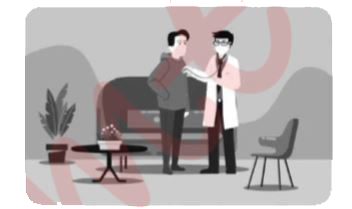
Based on the above information, answer the following questions.
When the doctor arrives late, what is the probability that he comes by other means of transport ?A67B514C421D27A doctor is to visit a patient. From the past experience, it is known that the probabilities that the he will come by cab, metro, bike or by other means of transport are respectively 0.3, 0.2, 0.1 and 0.4. The probabilities that the he will be late are 0.25, 0.3, 0.35 and 0.1 if he vomes by cab, metro,bike and other means of transport respectively.
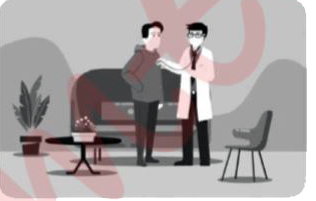
Based on the above information, answer the following questions.
When the doctor arrives late, what is the probability that he comes by cab ?A421B17C514D221A doctor is to visit a patient. From the past experience, it is known that the probabilities that the he will come by cab, metro, bike or by other means of transport are respectively 0.3, 0.2, 0.1 and 0.4. The probabilities that the he will be late are 0.25, 0.3, 0.35 and 0.1 if he vomes by cab, metro,bike and other means of transport respectively.
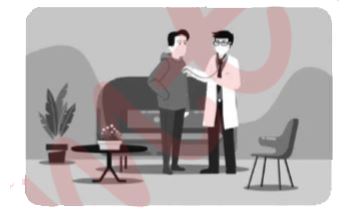
Based on the above information, answer the following questions.
When the doctor arrives late, what is the probability that he comes by bike ?A521B47C56D16
I believe that he will come.
View SolutionA person goes to his office by using different means of transport on different days. It is know that the probabilities that he will come by train, bus, scooter or by car are respectively 110,310,210 and 410. The probabilities that he will be late are 14,15,16, and 13 if he comes by train, bus, scooter and car respectively, on one day when he reaches office, he is late. What is the probability he has come by train?
View SolutionHe will come Sunday.
View SolutionA doctor is to visit a patient. From the past experience, it is known that the probabilities that the he will come by cab, metro, bike or by other means of transport are respectively 0.3, 0.2, 0.1 and 0.4. The probabilities that the he will be late are 0.25, 0.3, 0.35 and 0.1 if he vomes by cab, metro,bike and other means of transport respectively.
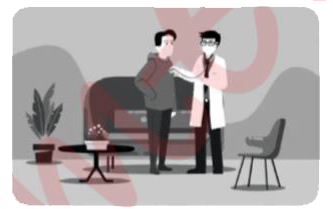
Based on the above information, answer the following questions.
When the doctor arrives late, what is the probability that he comes by metro ?
View SolutionA doctor is to visit a patient. From the past experience, it is known that the probabilities that the he will come by cab, metro, bike or by other means of transport are respectively 0.3, 0.2, 0.1 and 0.4. The probabilities that the he will be late are 0.25, 0.3, 0.35 and 0.1 if he vomes by cab, metro,bike and other means of transport respectively.
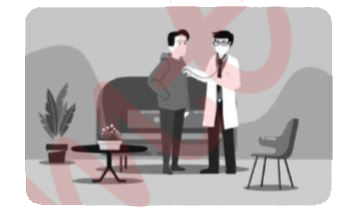
Based on the above information, answer the following questions.
What is the probability that the doctor is late by any means ?
View Solution
